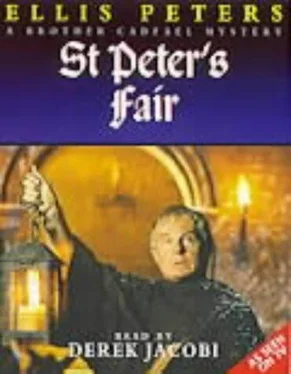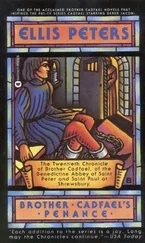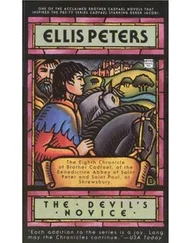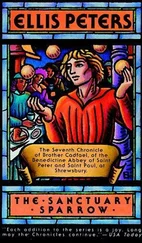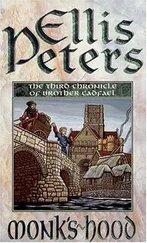Ellis Peters - St Peter's Fair
Здесь есть возможность читать онлайн «Ellis Peters - St Peter's Fair» весь текст электронной книги совершенно бесплатно (целиком полную версию без сокращений). В некоторых случаях можно слушать аудио, скачать через торрент в формате fb2 и присутствует краткое содержание. Жанр: Исторический детектив, на английском языке. Описание произведения, (предисловие) а так же отзывы посетителей доступны на портале библиотеки ЛибКат.
- Название:St Peter's Fair
- Автор:
- Жанр:
- Год:неизвестен
- ISBN:нет данных
- Рейтинг книги:4 / 5. Голосов: 1
-
Избранное:Добавить в избранное
- Отзывы:
-
Ваша оценка:
- 80
- 1
- 2
- 3
- 4
- 5
St Peter's Fair: краткое содержание, описание и аннотация
Предлагаем к чтению аннотацию, описание, краткое содержание или предисловие (зависит от того, что написал сам автор книги «St Peter's Fair»). Если вы не нашли необходимую информацию о книге — напишите в комментариях, мы постараемся отыскать её.
St Peter's Fair — читать онлайн бесплатно полную книгу (весь текст) целиком
Ниже представлен текст книги, разбитый по страницам. Система сохранения места последней прочитанной страницы, позволяет с удобством читать онлайн бесплатно книгу «St Peter's Fair», без необходимости каждый раз заново искать на чём Вы остановились. Поставьте закладку, и сможете в любой момент перейти на страницу, на которой закончили чтение.
Интервал:
Закладка:
Somewhere in that abrupt hell beyond the hearth, Ivo Corbière, shirt and hair aflame, a length of blazing tapestry fallen upon him, rolled and shrieked in agony, the sounds he made tearing her senses. Behind her one wall of the room was still clean, but the circling flames were licking round both ways towards it.
There was a rug untouched at her back, she dragged it up and tried to reach the burning man with it, but smoke thickened quickly, stinging and blinding her eyes, and flashing tongues of fire jetted out of the smoke and drove her back.
She flung the rug, in case he could still clutch at it and roll himself in its smothering folds, but she knew then that it was too late for anyone to help him.
The room was already thick with smoke, she clutched her wide sleeve over mouth and nostrils, and drew back from the awful screaming that shrilled in her ears.
And he had the key of the room on him! No hope of reaching him now, no hope of recovering the key. The room was ablaze, timber at window and wall and floor began to cry out in loud cracks and splitting groans, spurting strange jets of flame.
Emma drew back, shielding her face, and hammered at the door, shrieking for help against the furious sounds of the fire. She thought she heard cries somewhere below, but distantly. She knotted her hands in the tapestries on either side the door, where the flames had not yet reached, tore the rotting fabric down, rolled it up tightly to resist sparks, and hurled it into the furnace on the other side of the room. Let the door at least remain passable. All the hangings that were not yet burning she dragged down. Her seared hand she had forgotten, she used it as freely as the other. All those other lives, surely, were safe enough, no one was ever going to read the letter that had failed to reach Ranulf of Chester.
Even that fearful life shut in this room with her must be all but over, the sounds were almost lost in the voice of the fire. A busy, preoccupied voice, not unlike the obsessed hum of the fairground. She had a life to lose, too. She was young, angry, resolute, she would not lose it tamely. She hammered at the door, and called again. No one came. She heard no voices, no hasty footsteps on the stairs to the gallery, nothing but the singing of the fire, mounting steadily from a hum to a roar, like a rioting crowd, but better harmonised, the triumphant utterance of a single will.
Emma stooped to the keyhole, and called through it as long as breath and strength lasted. She could neither see nor think by then, all about her was gathering blackness, and a throttling hand upon her throat. From stooping she sank to her knees, and from her knees sagged forward along the base of the door, and lay there with mouth and nose pressed against the gap that let in a thread of clean air. After a while she was not aware of anything, even of breathing.
CHAPTER 4
Philip lost himself briefly in the tangle of small valley tacks that threaded the hills, after leaving the Long Forest, and was forced to hunt out a local man from the first assart he came to, to put him on the road for Stanton Cobbold.
The region he knew vaguely, but not the manor. The cottar gave him precise instructions, and turning to follow his own pointing, saw the first thin column of smoke going up into a still sky, and rapidly thickening and darkening as he stared at it.
“That could be the very place, or near it. The woods are dry enough for trouble.
God send they can keep it from the house, if some fool’s set a spark going ...”
“How far is it?” demanded Philip, wildly staring.
“A mile and over. You’d best …” But Philip was gone, heels driving into his stolen horse’s sides, off at a headlong gallop. He kept his eyes upon that growing, billowing column of smoke more often than upon the road, and took risks on those little-used and eccentric paths that might have fetched him down a dozen times if luck had not favoured him. With every minute, the spectacle grew more alarming, the red of flames belching upward spasmodically against the black of smoke. Long before he reached the manor, and came bursting out of the trees towards the stockade, he could hear the bursting of beams, splitting apart in the heat with louder reports than any axe-blow. It was the house, not the forest.
The gate stood open, and within, frantic servants ran confusedly, dragging out from hall and kitchen whatever belongings they could, salvaging from the stables and byres, dangerously near to the wooden part of the house, terrified and shrieking horses, and bellowing cattle. Philip stared aghast at the tower of smoke and flames that engulfed one end of the house. The long stone building of hall and undercroft would stand, though as a gutted shell, but the timbered part was already a furnace. Confused men and screaming maids ran about distractedly and paid him no heed. The disaster had overtaken them so suddenly that they were half out of their wits.
Philip kicked his feet out of the stirrups which were short for him, but which he had never paused to lengthen, and vaulted from the horse, leaving it to wander at will. One of the cowmen blundered across his path, and Philip seized him by the arm and wrenched him round to face him.
“Where’s your lord? Where’s the girl he brought here today?” The man was dazed and slow to answer; he shook him furiously. “The girl - what has he done with her?”
Gaping helplessly, the man pointed into the pillar of smoke. “They’re in the solar - my lord as well … It’s there the fire began.”
Philip dropped him without a word, and began to run towards the stair to the hall door. The man howled after him: “Fool, it’s the hob of hell in there, nothing could live in it! And the door’s locked - he had the key with him …
You’ll go to your death!”
Nothing of this made any impression upon Philip, until mention of the locked door checked him sharply. If there was no other way in, by a locked door he would have to enter. He cast about him at all the piles of hangings and furnishings and utensils they had dragged out into the courtyard, for something he could use to break through such a barrier. The kitchen had been emptied, there were meat-choppers and knives, but, better still, there was a pile of arms from the hall. One of Corbière’s ancestors, it seemed, had favoured the battle-axe. And these craven creatures of the household had made no attempt to use so handy a weapon! Their lord could roast before they would risk a burned hand for him.
Philip went up the stone steps three at a time, and into the black and stifling cavern of the hall. The heat, after all, was not so intense here, the stone walls were thick, and the floor, too, was laid with stones over the great beams of the undercroft. The worst enemy was the smoke that bit acrid and poisonous into his throat at the first breath. He spared the few moments it took to tear off his shirt and bind it round his face to cover nose and mouth, and then began to grope his way at reckless speed along the wall towards the other end of the hall, whence the heat and the fumes came. He did not think at all, he did what he had to do. Emma was somewhere in that inferno, and nothing mattered but to get her out of it.
He found the foot of the staircase to the gallery by stumbling blindly over the first step, and went up the flight stooped low, because it seemed that the bulk of the smoke was rolling along the roof. The shape of the solar door he found by the framework of smoke pouring in a thin, steady stream all round it. The wood itself was not yet burning. He hammered and strained at the door, and called, but there was no sound from within but the crackling of the fire. No way but to go through.
He swung the axe like a berserker Norseman, aiming at the lock. The door was stout, the wood old and seasoned, but less formidable axes had felled the trees that made it. His eyes smarted, streaming tears that helped by damping the cloth that covered his mouth. The blows started the beams of the door, but the lock held. Philip went on swinging. He had started a deep crack just above the lock, so deep that he had trouble withdrawing the axe. Time after time he struck at the same place, aware of splinters flying, and suddenly the lock burst clear with a harsh, metallic cry, and the edge of the door gave, only to stick again when he had thrust it open no more than a hand’s breadth. The upper part, when he groped round it, offered no resistance. He felt along the floor within, and closed his hand upon a coil of silky hair. She was there, lying along the doorway, and though the heat that gushed out at him was terrifying, yet only the smoke, not the flames, had reached her.
Читать дальшеИнтервал:
Закладка:
Похожие книги на «St Peter's Fair»
Представляем Вашему вниманию похожие книги на «St Peter's Fair» списком для выбора. Мы отобрали схожую по названию и смыслу литературу в надежде предоставить читателям больше вариантов отыскать новые, интересные, ещё непрочитанные произведения.
Обсуждение, отзывы о книге «St Peter's Fair» и просто собственные мнения читателей. Оставьте ваши комментарии, напишите, что Вы думаете о произведении, его смысле или главных героях. Укажите что конкретно понравилось, а что нет, и почему Вы так считаете.
